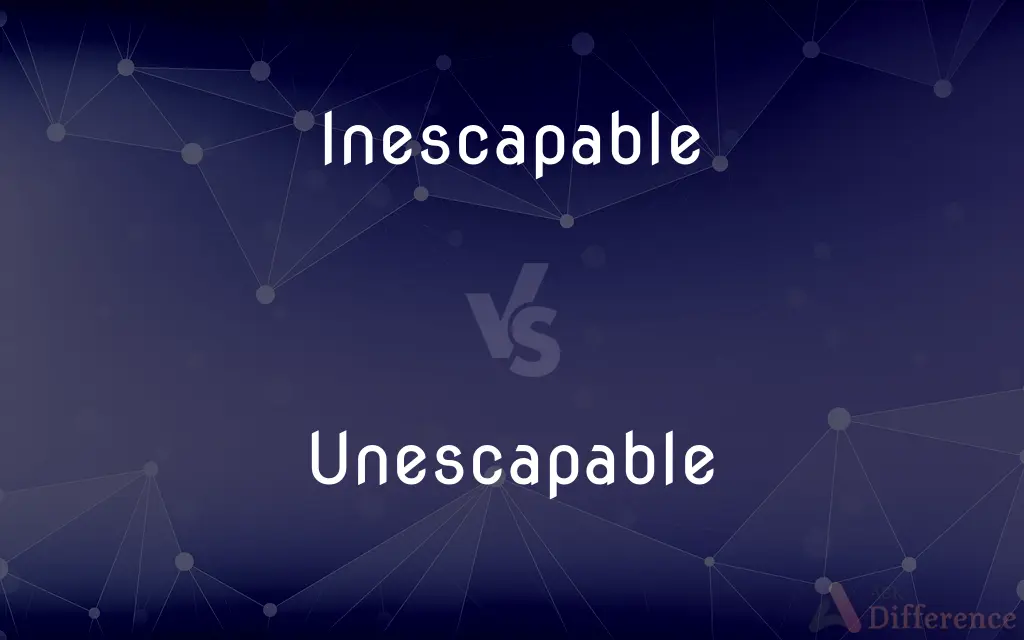Inescapable vs. Unescapable — What's the Difference?
By Tayyaba Rehman & Maham Liaqat — Updated on April 3, 2024
Inescapable and unescapable both convey the inability to escape, but inescapable is the more commonly used term in modern English to describe situations, consequences, or truths that cannot be avoided.

Difference Between Inescapable and Unescapable
Table of Contents
ADVERTISEMENT
Key Differences
Inescapable is widely used in contemporary English to denote something that cannot be avoided or evaded. It applies to scenarios where there is no possibility of escape, such as inescapable consequences or realities. This term is prevalent in both literary and everyday language, emphasizing the absolute certainty of facing something. On the other hand, unescapable, while technically correct and similar in meaning, is far less common in modern usage. It conveys the same sense of being unable to escape but is rarely found in contemporary texts or discussions. The preference for "inescapable" over "unescapable" is largely a matter of usage trends and the natural evolution of language.
The usage of inescapable often carries a tone of gravity or inevitability, suggesting that the subject in question is so pervasive or unavoidable that one must inevitably confront it. In contrast, unescapable, due to its rarity, might be used for stylistic reasons or to evoke a slightly different nuance in certain contexts. However, the fundamental meaning of not being able to escape remains the same in both terms.
In literature and academic writing, inescapable is the preferred adjective to describe concepts, conditions, or situations from which there is no exit. It's chosen for its clarity and familiarity to readers. Unescapable, while understood, might be selected for effect or to distinguish a particular emphasis but could also distract or confuse due to its uncommon nature.
The choice between inescapable and unescapable also reflects the speaker or writer's stylistic preference. While inescapable is favored for its conciseness and prevalence in the lexicon, using unescapable might signal a deliberate deviation to attract attention or to play with language creatively.
Despite the overwhelming preference for inescapable in most contexts, the existence of unescapable serves as a reminder of English's flexibility and the variations that can exist even in conveying similar concepts. The selection between them depends on the desired impact, the specific context, and personal or stylistic choices, though inescapable remains the standard and more universally accepted term.
ADVERTISEMENT
Comparison Chart
Usage
Commonly used in modern English.
Rarely used, less common.
Connotation
Implies a sense of inevitability or unavoidable truth.
Similar connotation, but may be chosen for effect.
Preference in Literature
Preferred for its familiarity and clarity.
Used less, often for stylistic reasons.
Tone
Carries a tone of gravity and certainty.
Same tone, but its rarity can add a stylistic nuance.
Context
Used in both literary and everyday language.
Mostly seen in older texts or for specific emphasis.
Compare with Definitions
Inescapable
Unable to be avoided or denied; certain.
The inescapable truth of aging affects us all.
Unescapable
Identical in meaning to inescapable, but rare.
In their hearts, they knew it was an unescapable truth.
Inescapable
Bound to happen; inevitable.
Facing consequences is inescapable when actions are irresponsible.
Unescapable
Implies an inability to avoid or evade.
The unescapable conclusion loomed over their decisions.
Inescapable
Something from which one cannot escape.
The conclusion was inescapable after all the evidence was presented.
Unescapable
Chosen for effect or emphasis in certain contexts.
The unescapable gloom of the cloudy days affected everyone's mood.
Inescapable
Universally present and unavoidable.
The inescapable beauty of nature surrounds us.
Unescapable
Sometimes used for stylistic variation.
The novel painted an unescapable portrait of dystopian life.
Inescapable
Present in all aspects and unavoidable.
They faced the inescapable reality of their situation.
Unescapable
Not able to be escaped or avoided; less commonly used.
The unescapable fate that awaited him was daunting.
Inescapable
Impossible to escape or avoid; inevitable
Inescapable consequences.
Unescapable
Impossible to avoid or escape, not escapable; ineluctable.
Inescapable
Impossible (unable) to avoid or escape; not escapable.
Inescapable
Not escapable.
Inescapable
Impossible to avoid or evade:
Inescapable conclusion
An ineluctable destiny
An unavoidable accident
Common Curiosities
Does the usage of unescapable change the meaning of a sentence?
No, the fundamental meaning remains the same, but the choice of unescapable might slightly alter the tone or style.
When should I use inescapable over unescapable?
Inescapable is preferred in most contexts due to its commonality and clear connotation of unavoidability.
Can unescapable be used in formal writing?
While technically correct, unescapable is rare and might be viewed as unconventional in formal writing. Inescapable is the safer choice.
How do I decide which term to use?
Consider the audience, context, and the tone you wish to convey. Inescapable is generally the best choice for clarity and acceptance.
Are there contexts where unescapable is more appropriate?
Unescapable might be chosen for stylistic reasons or to achieve a specific effect in literary or creative writing.
Is there a difference between inescapable and unescapable?
The main difference lies in usage and frequency; inescapable is widely used and accepted, while unescapable is much less common but has a similar meaning.
What does inescapable mean?
Inescapable refers to something that cannot be avoided, evaded, or denied; it is certain and unavoidable.
What is the origin of these terms?
Both terms derive from the prefix "in-" or "un-" meaning "not" and "escapable," from "escape," indicating something that cannot be escaped.
Can the preference for inescapable over unescapable change?
Language evolves, and usage can shift over time, but currently, inescapable is the more established term.
Is unescapable considered incorrect?
Not incorrect, but its rarity makes it less preferable to inescapable in standard English usage.
Share Your Discovery

Previous Comparison
Get vs. Retrieve
Next Comparison
Pycnocline vs. ThermoclineAuthor Spotlight
Written by
Tayyaba RehmanTayyaba Rehman is a distinguished writer, currently serving as a primary contributor to askdifference.com. As a researcher in semantics and etymology, Tayyaba's passion for the complexity of languages and their distinctions has found a perfect home on the platform. Tayyaba delves into the intricacies of language, distinguishing between commonly confused words and phrases, thereby providing clarity for readers worldwide.
Co-written by
Maham Liaqat













































